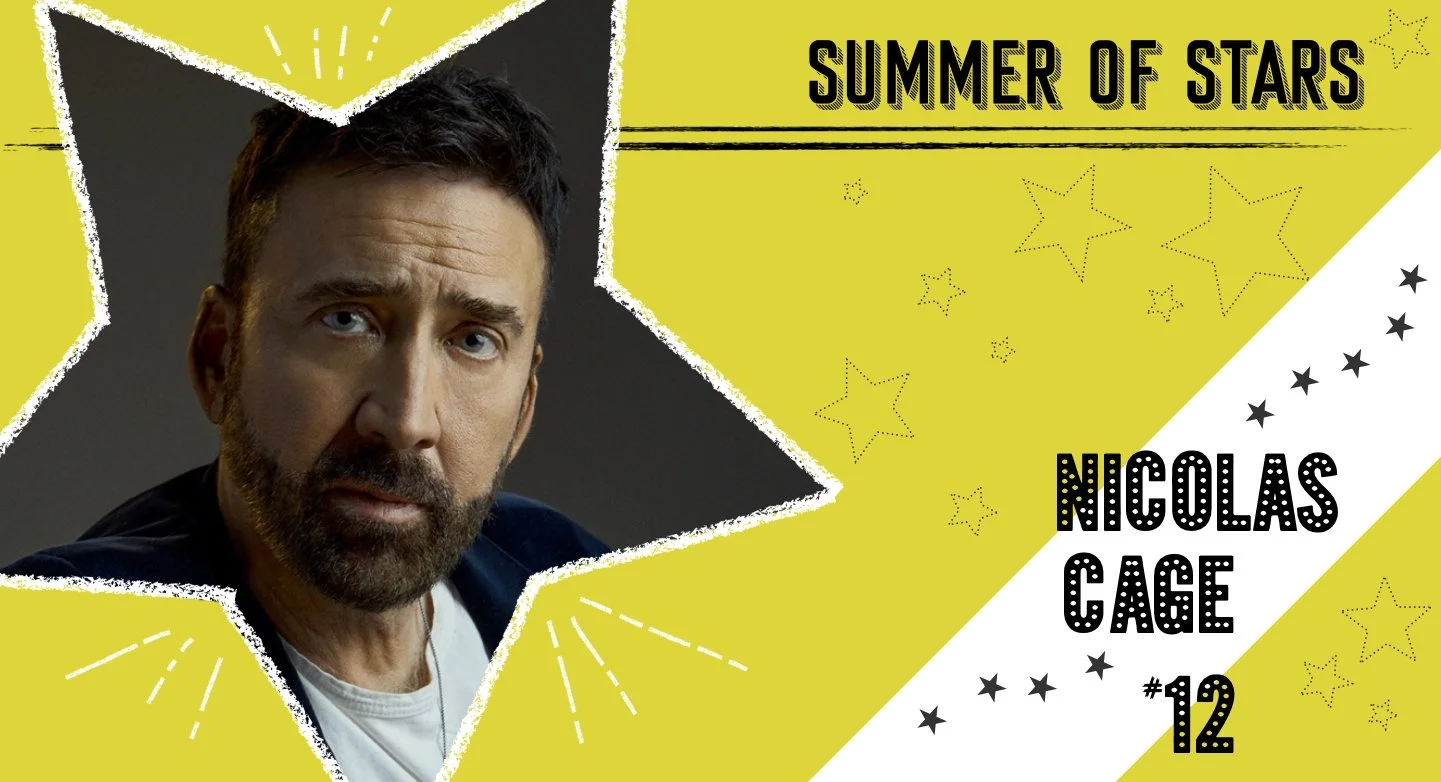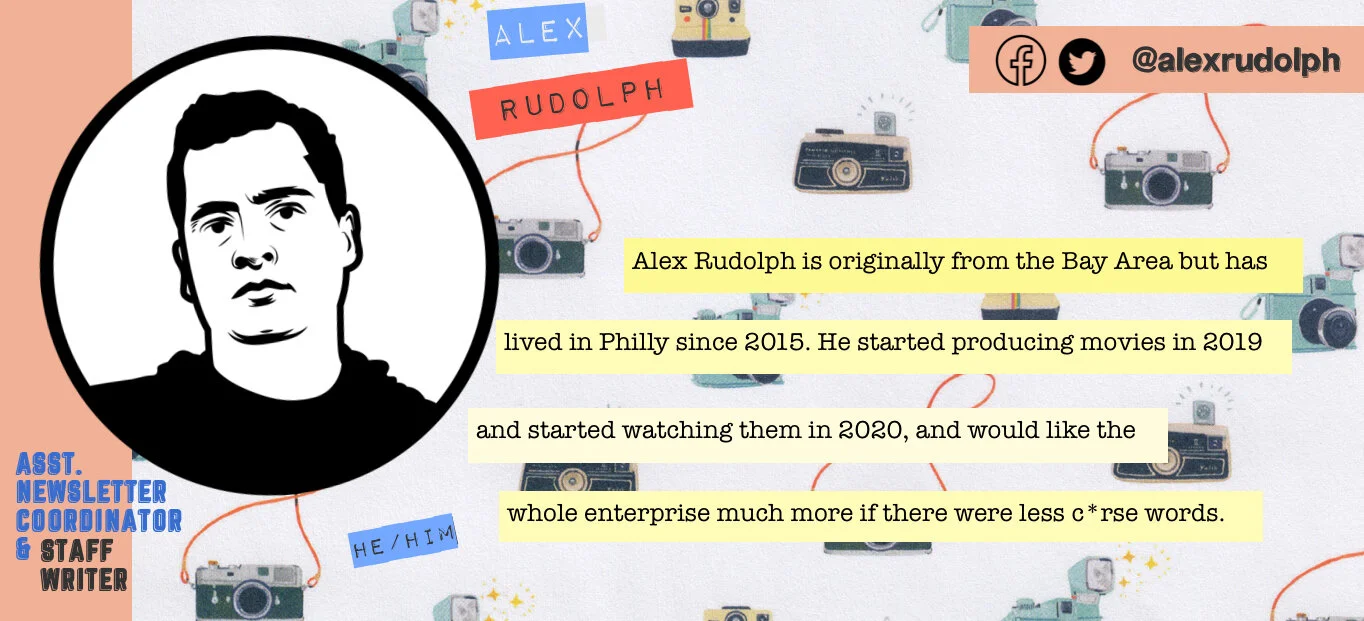SUMMER OF STARS #12: Nicolas Cage
Summer of Stars is a MovieJawn celebration of actors that have shined on the silver screen. Follow along as we count down some of our favorite players from various eras in the magical cosmos of cinema
by Alex Rudolph, Staff Writer
What was the last theatrically-released Nicolas Cage movie where his casting wasn't a huge deal, where you were just watching a movie that he was in? Because right now I'm looking at his IMDb and a Croods sequel is probably the only thing he's starred in since 2017 that anybody else could have made.
Everything else is notable because his characters never speak (Willy's Wonderland) or rarely speak, showing extreme restraint (Pig) or allow him to go over-the-top bugfuck (Mom and Dad). Mandy let him run that full gamut. He's ushered in the return of long lost auteurs (Color Out of Space) and played a heightened version of himself (The Unbearable Weight of Massive Talent). Even his cameos are events: Cage showed up in an animated Teen Titans movie and fulfilled a thirty-year quest to play Superman after a potential Tim Burton blockbuster fell through.
These are not gimmicks. They are choices by an actor who makes sure that when you see (or hear) him in a theater, you are getting something considered and crafted just for the character he's going to play and the movie he's going to be in.
That is a star. That is a guy who has real charisma but doesn't just fall back on it like a crutch. That is a person who thinks about how he holds his body in relation to other actors, but does it with enough intuitiveness that it never feels like you're watching the thirtieth take from the end of a long day.
And he does everything. Take any other actor on this list, regardless of gender, and Nicholas Cage has taken on their "thing." So far this week, MovieJawn has posted essays on Elizabeth Taylor and Jimmy Stewart, two of the most iconic actors of any generation, and Cage has done Who's Afraid of Virginia Woolf? and Cat on a Hot Tin Roof emotional explosions, Vertigo and Rear Window "one small man putting together big pieces" struggle. I would argue the Donald Kaufman half of his Adaptation performance is a pure expression of Frank Capra optimism. He's done Buster Keaton physical comedy and Arnold Schwarzenegger walking tank action heroics (I will always get a chill at the insane scene in Con Air where Cage's character gets shot in the arm and keeps walking forward without a flinch). His still-going-strong action movie run started one year after he won an Oscar for playing a quiet, suicidal alcoholic.
You will always learn something from a Nicolas Cage interview. Even if you're learning solely about his craft, you're learning about acting in general. A recent favorite: Earlier this year, to promote Pig, Cage spoke with IndieWire about conceptualizing his performance as a broken, reclusive genius as a haiku. It's a short talk and I'm going to paste an exchange where he expands on the haiku idea:
Anne Thompson: What was appealing to you about playing such a restrained character?
Nicolas Cage: At the time that I met with Michael [Sarnoski], and we had a quiet and meaningful conversation over shishito peppers, I had read his script… which resonated with me as a haiku. With Japanese haiku, you have 5-7-5 syllables. [They] convey the space between. It’s evocative and those spaces become more meaningful than the words themselves. The way Michael wrote the script, I felt it would lend itself to the kind of film performance I wanted to get back to.
Anne Thompson: Why?
Nicolas Cage: I had largely explored western Kabuki — what could be done with film performance in terms of the abstract and operatic and breaking form — and I wanted to get back to expression in film performance. That, for me, was why I became an actor. I was always interested in the work of James Dean and in the quiet performances of “Ordinary People” or “Midnight Cowboy.” I felt it had been a while. I needed to remind myself and some folks in the audience: “That was fun, and let’s get back to this.”
There are many things to unpack here, starting with Cage and writer-director Michael Sarnoski meeting over a meal. Sarnoski has a few other credits, but Pig is the first feature he's written or directed. You would have to actually steal the US Constitution or stop a nerve gas attack on San Francisco to be as famous as Cage is, but he's still taking the time to find young talent and support great work. He's the first to admit he's taken paycheck jobs, but I really can't think of anybody else at Cage's level still this interested in up-and-coming artists. He'll make movies with established legends like Paul Schrader and then he'll put his whole heart and soul into a script by an unproven newcomer. He takes the time. He sniffs out substance, wherever it's coming from.
And then we have the comparison to haiku. In this year's Unbearable Weight of Massive Talent, Cage plays a version of himself who talks about acting like it's the highest form of art, like it borders on public service. If Cage used this interview to compare acting to haiku and then left it at that, he'd risk coming off like Massive Talent's faux-Cage. It would be a little pompous because it would be a little empty. But he breaks the analogy down here. He explains it in such a way that you get where he's coming from and it makes perfect sense. Sometimes he picks roles for bizarre reasons-- he starred in Drive Angry because he wanted to play a character who got shot in the eye. Sometimes he approaches his work with a touch most people would never consider attempting.
What does it mean to star in a thousand movies? Does it dilute the brand, does it spread you too thin? No. It just means another person can write 914 words about you and somehow not mention Raising Arizona or Adaptation-level genius.


